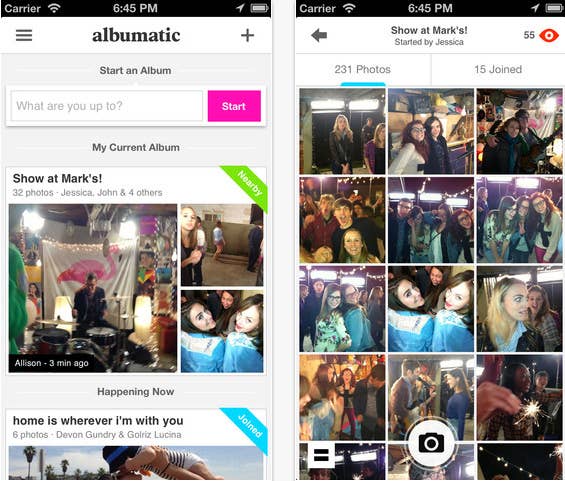
The pitch for Albumatic is short: It's a photo-sharing app similar in functionality to Instagram, except it's centered around albums. These albums are tied to places and events, and multiple people can join them. Three Albumatic users at the same party, for example, could start an album together and invite more people as the night goes on.
It's a well-designed app with the right people behind it — it shares talent with the team that just sold Vine to Twitter. But there are a lot of photo apps, and it's not always easy to tell why one succeeds over the other. And Albumatic is treading in a specific area — location-based group photo sharing — that has been more or less abandoned since the legendary collapse of Color.
Aside from the specter of Color, there's the issue of Snapchat — an app that, at least to the mainstream tech world, appeared out of nowhere. The app itself was (and still is) a bit of a mess, but it caught on with young people in a profound way; and unusually, it didn't depend on Facebook at all.
The success of Snapchat, in short, all came down to the teens: weird, inscrutable, unpredictable teens.
That's why Albumatic chose to test its app not just with a small group of friends and colleagues, but with actual young people.
Adam Ludwin, one of the creators of the app, explains. "What we found when we'd ask our testers about Snapchat is that they categorized it more as a game than as a utility," he says. "When we asked one of our 19 year old testers about Snapchat, she responded 'oh yeah I play that sometimes.' For her, Snapchat exists somewhere between Angry Birds and Facebook."
The strategy recalls MTV's infamous "Ethnographic Study" of teens, during which the network sent researchers to study young people in a detached, semi-scientific way. "Some of [the testers] are our nieces and nephews," says Ludwin, "others are friends of those family members, and a handful are actually the actors we cast in our launch video."
The most surprising (and perhaps useful) takeaway, he said, was that the teen testers didn't want to have to use Facebook to log in. "We ended up replacing our Facebook-only login with a login with email option because of our teen testers," says Ludwin. "Of the first seven we on boarded, two of them didn't have Facebook. When I asked them why, they responded that they were bored with it."
"I have no idea if that is true or just what teenagers say about everything they don't like, but it really got us thinking," he says. "We tried for a long time to stay Facebook-only but it was the teens that finally pushed us into creating our own social graph, and we're extremely happy we did in the end. It's giving everyone a clean slate."
It's hard not to sense a slight sense of wistfulness in the whole endeavor. A classic element of the modern startup origin myth is that these apps, these sites, are designed not just for but by people who are comfortably and natural ahead of the rest of the world — they're young, they're cool, they get things that the men in suits at the big companies don't.
But that time has passed, which is why the strategy makes an awful lot of sense. Remember: Facebook, the gravitational center of the galaxy of the startup world, is almost ten years old. The users Albumatic is targeting are just a few years older.

